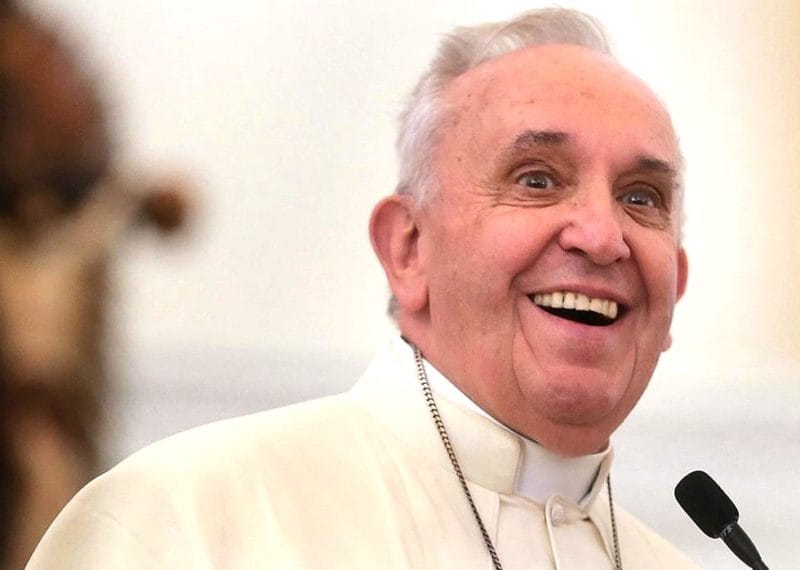Inrecent weeks, a number of writers have lamented Pope Francis’ failure to transform public opinion on climate change. Did the pope’s encyclical on the environment alter the views of American Catholics? Not really. Did his address to Congress sway Republican politicians? No. But that’s okay.
We may come to see Pope Francis as the Will & Grace of climate change. That is not to say that he is Will, a compulsive neat freak with perfect hair, or Grace, Will’s self-absorbed counterpart, or even Jack, their persistently flamboyant friend. Rather, the pope is Will & Grace, the show — all of it. He is at once trendy and tendentious, and when he’s not making us laugh and smile, Il Papa is challenging Americans to think hard about the defining issue of our time.
To understand, let’s hop in our time machine and travel back to August 1998. Bill Clinton was president. “The Boy Is Mine” was song of the summer. Beanie babies were grossly overvalued. At that precise moment, Will & Grace was set to premiere on NBC. No one expected the quirky sitcom to permanently alter American politics, but 14 years later, the vice president of the United States told Meet the Press, “I think Will & Grace probably did more to educate the American public [on gay rights] than almost anybody’s ever done so far.”
That’s not to suggest Will & Grace was the coup de grace of the gay rights movement — in fact, the importance of the show is surely overstated. But when taken together with other positive representations of gays and lesbians, the hard work of gay rights activists, and the courage of gay Americans who came out to their friends, family and coworkers, Will & Grace played an important role in normalizing homosexuality.
Pope Francis is also nudging Americans’ attitudes, this time on climate change. The pope’s message on global warming is not a fourth quarter Hail Mary pass (pun intended). It’s a forced fumble in the second quarter that, in hindsight, will turn out to have been a game changer. That’s because the pope isn’t influencing climate policy in the short term through the strength of his argument. He is changing the conversation around climate change in the long term by helping to reshape social norms.
The pope is making it easier for the climate-conscious to “come out” on global warming. Francis gave the green light to Catholic bishops to be vocal about climate change. Since the publication of his encyclical, religious leaders have spoken out about the carbon crisis, including the heads of the Episcopal Church, who announced they would divest from fossil fuels, and the University of Notre Dame, which declared it would stop burning coal to generate electricity. These are not fringe environmental groups. These are mainstream American institutions taking a moral stand.
Every school, business, or right-thinking individual who “comes out” on climate change is showing others that it’s okay to do the same. Pope Francis stands among the trendsetters, the conscientious men and women taking small steps to use less energy — turning off the A/C, using public transportation, going vegetarian. These are the early adopters of a low-carbon lifestyle. They’re saying, loud and proud: We’re here. We’re taking a bike to work. Get used to it.
As more and more Americans go green and more and more institutions speak out about climate change, it will become harder to deny the reality of human-caused climate change. When Will & Grace took to the air, homophobia was one of the few remaining publicly sanctioned forms of prejudice. Even Barack Obama, when he was campaigning in 2008, deliberately voiced his opposition to same-sex marriage. Now, marriage equality is the law of the land and Scott Walker says he would attend the reception of a gay wedding. It works the same way with global warming: To normalize acceptance of human-caused climate change is to put deniers on the defensive. Already, the pope’s proclamations on climate change and capitalism have left Catholic GOP presidential candidates in a bind.
Pope Francis’ real sleight-of-hand, however, is that he is able to undermine the contrarians without beating them over the head. The New Republic’s Rebecca Leber lamented that the pope never once uttered the words “climate change” in his address to Congress, but that was a feature, not a bug. Because just like Will & Grace — which did discuss civil unions but never broached the subject of gay marriage — the pope can speak volumes with very few words. Lawmakers get it. The climate is changing. The pope is worried. And just like the three-camera sitcom, the Catholic Church is as relevant as ever.
If the pontiff’s message on climate change feels inconsequential now, it’s not a flash in the pan. Pope Francis has made the care for our common home a central part of the church’s mission, offering a new avenue for faith leaders to drive home the moral argument for climate action. In other words, he is making it normal to care about climate change. And while there isn’t a good yardstick yet for measuring the Francis effect, we may look back in 10 or 15 years’ time and see the pope’s “coming out” as a turning point.
Jeremy Deaton writes for Nexus Media, a syndicated newswire covering climate, energy, policy, art and culture. You can follow him @deaton_jeremy.


